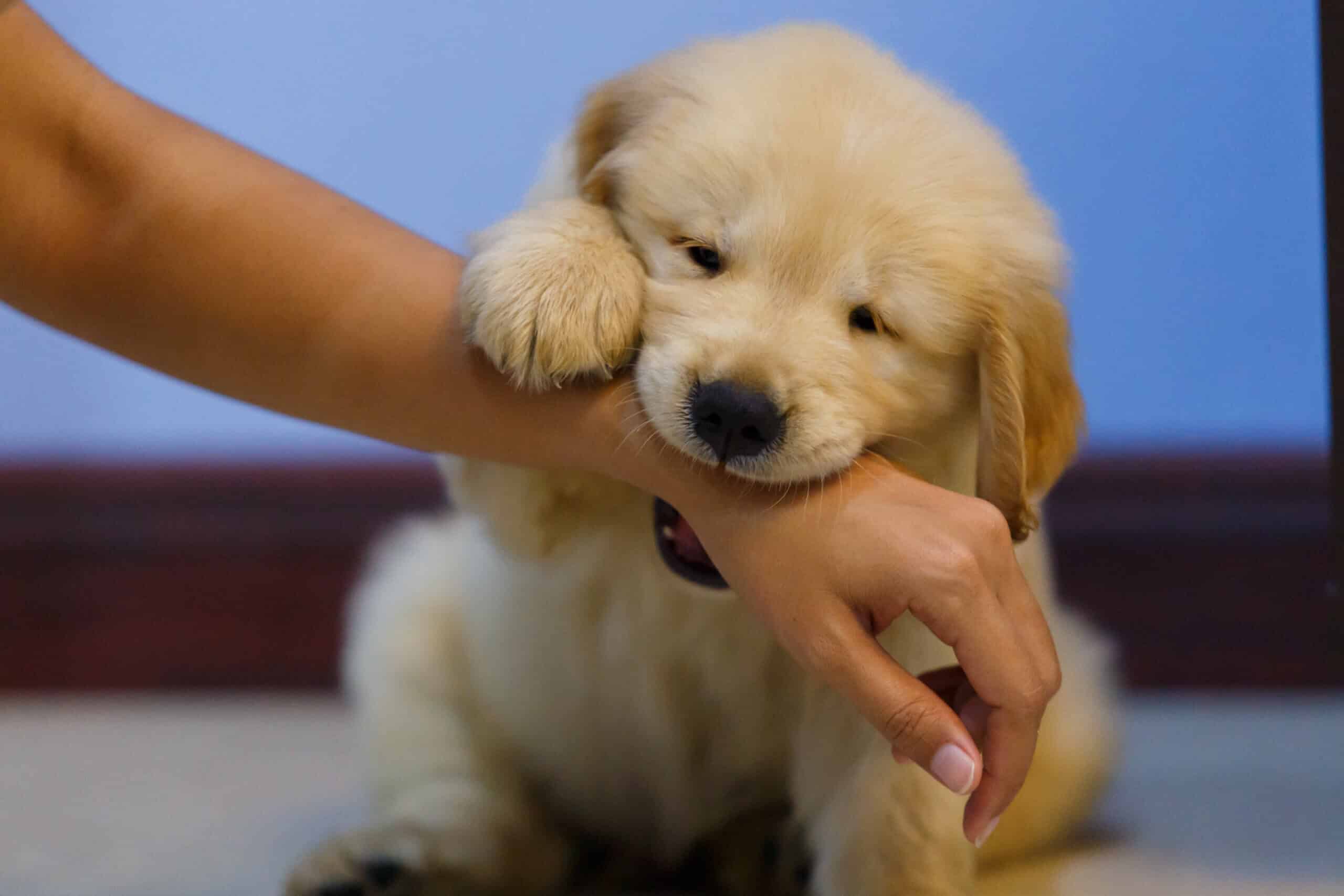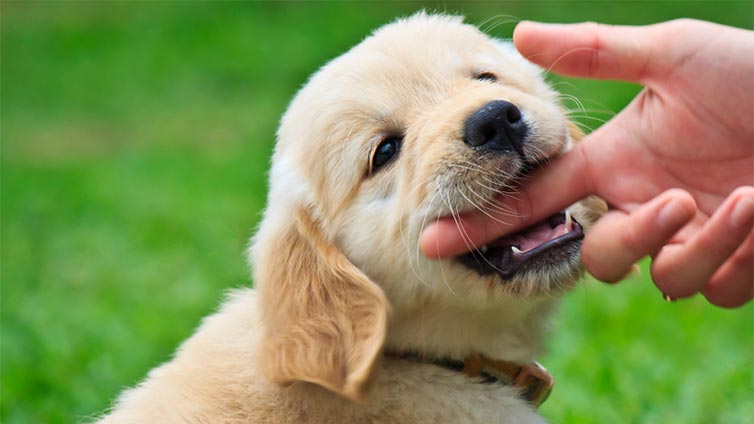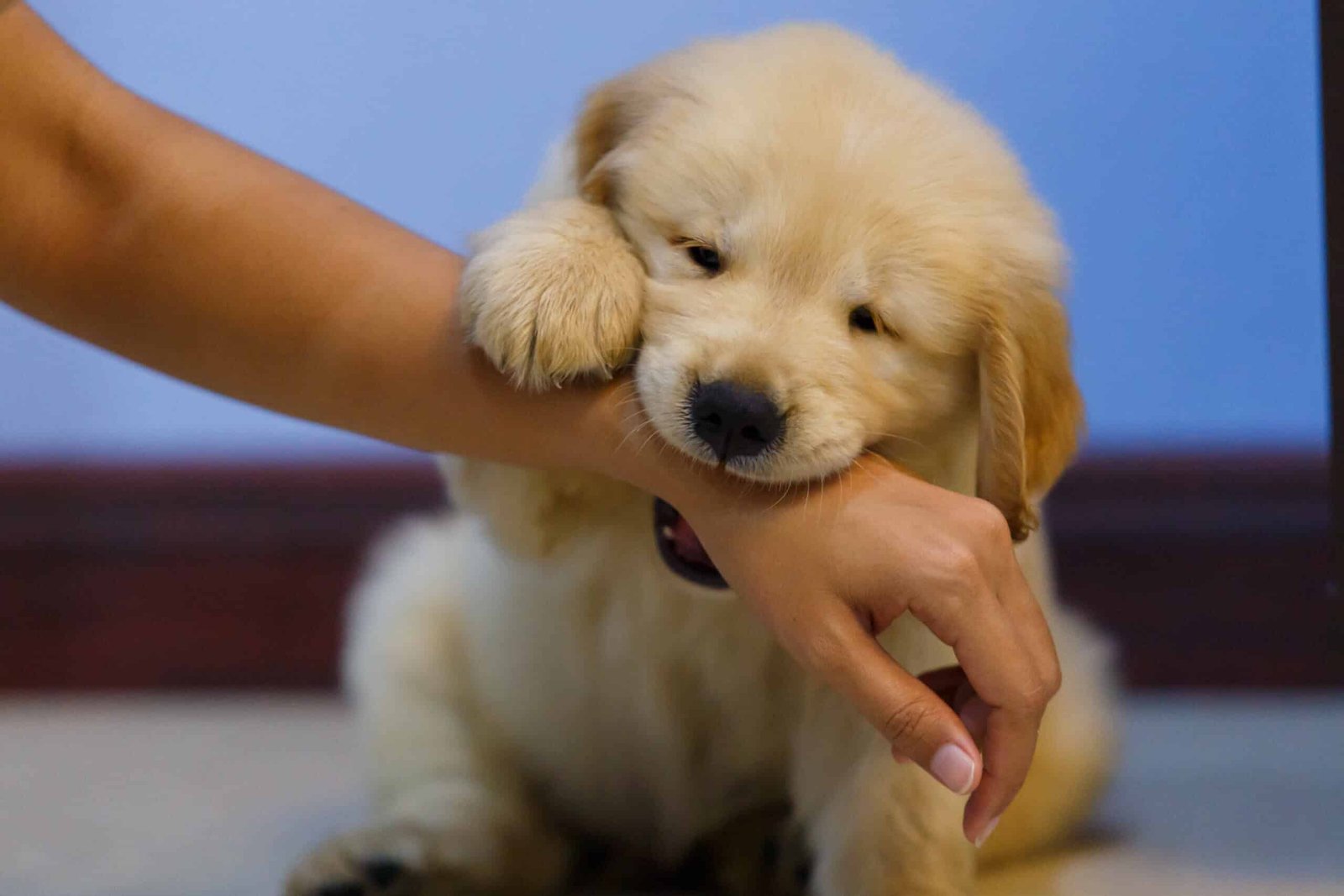Are you wondering if golden retriever puppies bite? Well, let me tell you, these fluffy bundles of joy can indeed be nippers! But fret not, because in this article, we’ll explore why golden retriever puppies have a tendency to bite and how to address this common behavior.
So, why do golden retriever puppies bite? You see, when they’re young, these adorable furballs are just like human babies—they use their mouths to explore the world around them. It’s their way of learning and teething. But don’t worry, with a little patience and proper training, you can teach your furry friend to have a softer mouth and prevent any unwanted nips or bites.
Now, you might be thinking, “How do I stop my golden retriever puppy from biting?” Don’t worry, we’ve got you covered! In the next section, we’ll dive into some effective tips and tricks to help curb this behavior and ensure harmony between you and your lovable golden retriever companion. So let’s get started!

Do Golden Retriever Puppies Bite? Understanding Their Behavior
Golden Retriever puppies are adorable, playful, and full of energy. However, as with any puppy, it’s natural for them to explore their world through biting. In this article, we’ll delve into the topic of whether Golden Retriever puppies bite, why they do it, and how to address and prevent this behavior. Let’s get started!
Why Do Golden Retriever Puppies Bite?
Golden Retriever puppies, like all young dogs, go through a teething stage where they instinctively feel the need to chew and bite on objects. This is a normal part of their development, as it helps alleviate teething discomfort and allows them to explore their environment. Additionally, puppies use their mouths to play and interact with their littermates, practicing social skills and learning bite inhibition.
It’s important to note that Golden Retriever puppies don’t bite out of aggression or to intentionally harm others. They bite as a means of communication and exploration. However, if not addressed properly, this behavior can become a problem as they grow older.
To discourage biting, it’s crucial to provide Golden Retriever puppies with appropriate chew toys to redirect their biting behavior. Additionally, owners should engage in appropriate play with their puppies, using interactive toys and encouraging gentle play. Consistency, patience, and positive reinforcement are key when addressing biting behavior in Golden Retriever puppies.
Addressing and Preventing Biting Behavior
1. Socialization: Golden Retriever puppies should be exposed to a variety of people, places, and situations from a young age. This helps them become more comfortable and confident, reducing the likelihood of fearful or defensive biting.
2. Bite inhibition training: Teaching your Golden Retriever puppy bite inhibition is crucial. This involves exposing them to gentle biting during play and rewarding them when they exhibit soft mouths. If they bite too hard, let out a yelp or stop play momentarily to teach them that biting leads to the end of a fun activity.
3. Consistent training and positive reinforcement: Use positive reinforcement techniques, such as treats, praise, and toys, to reward your Golden Retriever puppy for calm and gentle behavior. Consistency is key to reinforce desired behaviors and discourage biting.
4. Seek professional help if necessary: If your Golden Retriever puppy’s biting behavior persists or becomes aggressive, it’s important to seek guidance from a professional dog trainer or behaviorist. They can assess the situation and provide specialized advice and training techniques.
Remember, stopping biting behavior in Golden Retriever puppies requires patience, consistency, and positive reinforcement. By providing appropriate outlets for their natural instincts and behaviors, you can help steer them towards becoming well-behaved adult dogs.
Tips for Nipping Biting in the Bud
1. Supervise playtime: Always supervise your Golden Retriever puppy during playtime with children or other pets. If biting becomes too rough, redirect their attention to a toy and provide positive reinforcement for appropriate play.
2. Use a firm but gentle voice: When your Golden Retriever puppy bites, firmly say “no” while redirecting their attention to an appropriate chew toy. Avoid yelling or using physical force, as this may escalate the situation.
3. Provide mental stimulation: Golden Retrievers are intelligent dogs that require mental stimulation to prevent boredom. Engage in activities such as puzzle toys, obedience training, and interactive games to keep their minds occupied and reduce the likelihood of biting out of boredom.
4. Be patient and consistent: Changing behavior takes time and consistency. It’s important to be patient with your Golden Retriever puppy and consistently enforce positive behavior. Consistency in training and reinforcement will help them understand what is expected of them.
5. Seek professional guidance if needed: If your Golden Retriever puppy’s biting behavior persists or becomes a safety concern, don’t hesitate to consult a professional dog trainer or behaviorist. They can provide tailored advice and guidance to address the specific challenges you’re facing.
Remember, biting is a natural behavior for Golden Retriever puppies, but with patience, consistency, and gentle guidance, you can redirect their biting instincts and teach them appropriate manners. By addressing and preventing biting behavior early on, you’ll set the foundation for a well-behaved and happy companion.
The Benefits of Properly Training Golden Retriever Puppies
Training your Golden Retriever puppy goes beyond addressing biting behavior. Proper training sets the stage for a well-behaved and balanced adult dog. Here are a few benefits of training your Golden Retriever puppy.
1. Improved Communication and Bonding
Training allows you to establish clear communication with your Golden Retriever puppy. As you work on commands and cues, you’ll develop a stronger bond and understanding of each other. This bond is essential for a harmonious and fulfilling relationship with your dog.
2. Increased Safety
A well-trained Golden Retriever puppy understands basic commands like “sit,” “stay,” and “come.” This knowledge can be crucial in potentially dangerous situations, such as crossing roads or encountering unfamiliar dogs. Training teaches your puppy to respond reliably to your commands, ensuring their safety and the safety of those around them.
3. Reduced Behavioral Issues
Proper training helps prevent and address behavioral issues before they escalate. By teaching your Golden Retriever puppy appropriate behaviors and providing mental stimulation, you can reduce the likelihood of problems like excessive barking, chewing, or aggression.
4. Enhanced Socialization
Training your Golden Retriever puppy allows for controlled socialization experiences. Through obedience classes or supervised interactions, your puppy can learn how to interact appropriately with other dogs, people, and various environments. This socialization is vital for raising a confident, well-adjusted dog.
5. Increased Trust and Freedom
A well-trained Golden Retriever puppy can be trusted off-leash in safe environments, offering them the freedom to explore and enjoy their surroundings. This trust is built through consistent training and positive reinforcement, providing both you and your dog with a greater sense of freedom and enjoyment during walks and outings.
Training your Golden Retriever puppy requires time, effort, and patience. However, the benefits of a well-behaved and trained dog far outweigh the initial investment. From improved communication and safety to reduced behavioral issues and enhanced socialization, training sets the stage for a happy and fulfilling life with your Golden Retriever companion.
Key Takeaways: Do Golden Retriever Puppies Bite?
- Golden Retriever puppies may bite during their teething stage.
- It is important to provide them with appropriate chew toys to redirect their biting behavior.
- Training and socialization can help minimize puppy biting habits.
- Consistent positive reinforcement is essential in teaching puppies not to bite.
- Seek professional help if puppy biting becomes aggressive or uncontrollable.
Frequently Asked Questions
Welcome to our FAQ section where we answer some common questions about golden retriever puppies and biting behavior. Golden retrievers are known for their friendly and gentle nature, but it is natural for puppies to bite as they explore the world around them. Below, we address some concerns you may have about this behavior.
1. How can I stop my golden retriever puppy from biting?
Biting is a normal behavior for puppies as they go through the teething phase and explore their surroundings. However, it’s important to redirect this behavior to prevent it from becoming a problem. One effective technique is to provide plenty of appropriate chew toys for your puppy to bite on. When your puppy starts biting, firmly say “no” and replace your hand or clothing with a chew toy. Remember to reward your puppy with praise or treats when they use the chew toy instead. Consistency is key in teaching your puppy that biting on toys is acceptable, while biting on people or objects is not.
Another effective strategy is to teach your puppy bite inhibition. This involves teaching them to control the pressure of their bite by yelping or saying “ouch” when they bite too hard. This mimics how other puppies or dogs would react during play. By doing this, your puppy will learn to be more gentle with their bite. It’s also important to socialize your golden retriever puppy with other dogs and people so they learn appropriate play behavior.
2. Is it normal for golden retriever puppies to bite during play?
Yes, it is completely normal for golden retriever puppies to bite during play. Puppies explore their surroundings and interact with others through play, and biting is a part of their natural behavior. Biting while playing is often a result of their instincts and learning boundaries. However, it’s important to teach your puppy bite inhibition and redirect their biting activities to appropriate toys or objects. This helps them understand what is acceptable behavior during playtime.
If your puppy bites too hard or becomes too rough during play, it’s essential to stop the play session temporarily. This teaches your puppy that biting too hard ends the fun. By consistently redirecting their biting and setting boundaries, you can help them develop good play habits and grow into well-behaved adult dogs.
3. When will golden retriever puppies stop biting?
Golden retriever puppies usually stop biting as they grow older and develop better impulse control. The biting behavior is most common during the teething phase, which typically occurs between the ages of 3 to 6 months. As their adult teeth come in, the discomfort diminishes, and their biting behavior tends to subside.
It’s important to note that each puppy is different and may take varying amounts of time to stop biting. Consistency in training and redirecting their biting behavior will aid in the process. If your golden retriever puppy continues to bite aggressively or excessively even after the teething phase, it may be beneficial to seek guidance from a professional dog trainer or behaviorist.
4. Are there any signs that biting may be a problem with golden retriever puppies?
While biting is normal for golden retriever puppies, it’s essential to understand when it may become a problem. Excessive biting that is accompanied by aggression, growling, or breaking the skin can be signs of deeper behavioral issues. If your puppy’s biting seems to be more intense, defensive, or fearful, it’s important to seek professional guidance to address these underlying concerns.
Additionally, if your golden retriever puppy continues to bite excessively or shows signs of discomfort or pain while biting, it is recommended to consult with a veterinarian. They can check for any dental or health issues that may be contributing to your puppy’s behavior.
5. Is it necessary to seek professional help if my golden retriever puppy’s biting becomes a problem?
If your golden retriever puppy’s biting becomes a persistent problem or if you are concerned about their behavior, it is advisable to seek professional help. A professional dog trainer or behaviorist can assess the situation, identify any underlying issues, and provide guidance on how to address the biting behavior effectively. They can offer specialized training techniques and strategies tailored to your puppy’s specific needs.
Remember, early intervention and consistent training are key to correcting biting issues and ensuring your golden retriever puppy becomes a well-behaved and sociable adult dog. Seeking professional help can provide you with the necessary tools and support for a successful training journey.

Do This Every Day To Stop Golden Retriever Puppy Biting
Summary
So, in summary, golden retriever puppies do have a tendency to bite during their teething phase. It’s a normal and natural behavior for them to explore the world around them. However, it’s important for puppy owners to teach their golden retrievers proper bite inhibition and provide them with appropriate chew toys. This will help redirect their biting behaviors and prevent any harm or discomfort.
Remember, biting is a part of their development, but it’s crucial to set boundaries and teach them that biting humans or furniture is not acceptable. By using positive reinforcement and consistent training, you can guide your golden retriever puppy towards becoming a well-behaved and gentle adult dog. So don’t worry, with patience and love, you can help your golden retriever become a well-mannered companion.
